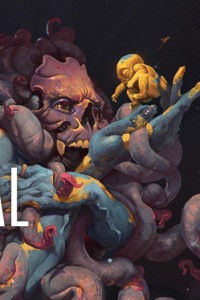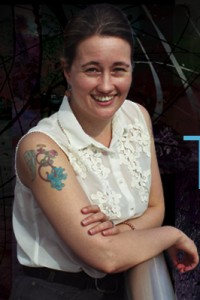Jack Skillingstead: Watchmaker

John Skillingstead was born in a working-class suburb of Seattle WA. He attended community college from 1974-76 before dropping out to work in a cannery in Alaska. He also lived a year in Maine, where he eventually returned to marry Kathy Scanlon in 1985; they later divorced, but have two children, aged 18 and 20. Skillingstead now lives in Seattle, and works for Boeing.
In 2000 Skillingstead entered a writing competition sponsored by Stephen King. A year later he learned he was one of five winners. In 2003 he began publishing stories in small-press magazines, but his first professional sale was Sturgeon Award finalist “Dead Worlds” to Asimov’s (2003). He has since published around 30 stories, most in Asimov’s but also appearing in F&SF, Realms of Fantasy, assorted anthologies, On Spec, and Talebones. His first collection, Are You There and Other Stories, was published by Golden Gryphon this year, and Fairwood Press just published his first novel Harbinger.
Excerpts from the interview:
“I began writing about age 12, in a haphazard way. When I was a kid, I had the idea I’d like to write. Back then it was more of an optimistic idea. As for learning to write, I learned by doing. In my early twenties I tried to take stories apart like watches. I would find a story I kind of liked (but not one that I was in love with) and I would type it up so I could see what it looked like as it came out of the typewriter — this was before computers. It looks crappy, right? That took a little bit of the mystery out of things, because it didn’t look as perfect as it did in print. I think this is something students lose now. In fact, if I ever teach Clarion I’m going to make them write stories longhand! If your story looks perfect, like it’s set in type, you might start thinking it is perfect. But if it looks crappy, like a line of typewriter type or something in a notebook, you’re forced to really concentrate on what you’re saying, word by word.
“I would do this, type out published stories, and then I would go through paragraph by paragraph, analyzing in very basic terms what the story was doing, and I’d think, ‘Why did I like this so much?’ Sort of like doing an autopsy on a body. Say there’s some guy you like, your best friend, even, and you go to work at the morgue one day, and there he is on the table. You’re cutting him up, removing his organs, weighing and measuring, but you can’t figure it out — why was he so magical, wonderful, intelligent yesterday, and now he’s a corpse? Taking these stories apart had that effect. In some ways the exercise didn’t really help, because I couldn’t see where the magic was. I could see that some writers I was in awe of weren’t writing sentences much better than mine. That helped.”
*
“I got serious about writing around the time I returned from Alaska. Twenty years old, I guess. I worked in a restaurant, bartended for a few years, while I wrote stories. Then I moved to Maine and I thought, ‘I’m going to be a writer, no matter what.’ Ten years later I was still saying that, only now I was married and had kids, and I had to make some money, so I joined the union, took these soulless factory jobs that grind you down over time in a serious way. Vonnegut said in one of his essays that such jobs aren’t particularly soulless, and I guess he was right. Though I note he quit G.E. as soon as The Saturday Evening Post started paying him real money for his short stories. Anyway, I always had the belief, ‘Eventually, I’m going to break through. I’m going to make it.’ I mean, you have to believe that, right? Working at dead-head jobs forces you to construct a self-image based on who you believe you are inside as an artist or writer, and the rest of your life orbits around that. It’s a matter of self-invention. I didn’t want a real career outside of writing. I didn’t want the distraction.
“I wrote eight novels, probably a million words or more, including the short stories, and I couldn’t get anywhere. (I sold some of the stories later to On Spec, but they’d been bouncing around for years.) All but one of the novels were genre, but they weren’t all science fiction. There were serial killer novels, detective novels. My best failed novel was a weird fantasy involving masturbation as a means of communicating between a Japanese barista in our world and a guy trapped in an alternate reality created inside the mind of a psychotic homeless man. That one I still have hope for! It’s a love story.”
*
“Harbinger is kind of a Rorschach novel. The way you see key elements depends on what you expect or want. That’s deliberate, a design intention. And it’s thematically consistent with the story. Is this going on, or is that going on? Do we have to know? What counts is, you’re on board for the trip. The kiss at the end does mean something important. In so-called real life, it’s the same thing, right? What the hell is going on here, do I really love my wife, do my kids really love me? Time seems to stretch or contract, depending on God knows what. Your job feels meaningless. You look at the people around you, all these people, and you wonder how can they be individual personalities? The chaos of the world. It seeps in. Then you have this human moment, this gentle little thing, a kiss, for instance, and the world falls into place around that and it’s okay to go on, to get on with it all.
“My other book is Are You There and Other Stories. This collection contains most of my short fiction published since 2004. And the book is just wonderful — I mean as a physical artifact, the binding, the cover art, the type and design. You crack it open and bury your nose in it, just smell the paper. How does this happen? Golden Gryphon was a long-shot for me, considering the short time I’ve been publishing. But here’s the way reality can bend around your ambition. Some years ago I was in a local independent bookstore, and I was looking at Jim Kelly’s Strange But Not A Stranger collection, and I thought, ‘God damn that’s a beautiful book. What if I had one of those?’ Now I do. The big New York publishers, unless you’re selling in really huge numbers, I don’t think they give this kind of attention to detail anymore. I guess they can’t, because of the expense or whatever.
“The stories in Are You There form a picture of a certain type of personality, what my girlfriend calls ‘tortured lonely guy’ and I call ‘the outsider.’ Obviously that term is nothing I came up with. Meursault is an outsider, Raskolnikov — these guys that have a little trouble connecting, right? At least my characters aren’t estranged to the point of murder, unless it’s self-murder, suicide.
“But now I feel I might be done with that approach, and it’s very scary. What’s next? I’ve been writing new stories, building up a backlog that eventually I’ll get around to submitting. First I have to figure out what I’m doing all over again.”
This interview and more like it in the November 2009 issue of Locus.
 While you are here, please take a moment to support Locus with a one-time or recurring donation. We rely on reader donations to keep the magazine and site going, and would like to keep the site paywall free, but WE NEED YOUR FINANCIAL SUPPORT to continue quality coverage of the science fiction and fantasy field.
While you are here, please take a moment to support Locus with a one-time or recurring donation. We rely on reader donations to keep the magazine and site going, and would like to keep the site paywall free, but WE NEED YOUR FINANCIAL SUPPORT to continue quality coverage of the science fiction and fantasy field.





